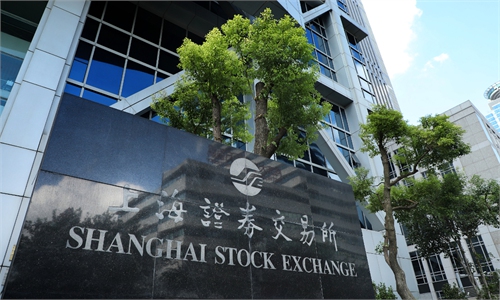
Stock market Illustration: VCG
China's equities market is undergoing a significant overhaul this year, as more emphasis is being placed on strict day-to-day supervision and scrutiny of corporate information disclosure. The country's top financial regulators are also implementing across-the-board registration-based reforms and optimizing the independent director system to bring the capital market in line with global standards and practices.
By whatever metrics, market supervision is becoming increasingly stringent now. A total of 46 companies were delisted from the A-share market in 2022, setting a new record high. The maturity of capital market administration can be reflected in the growing magnitude of the de-listings, aimed at enhancing quality of the listed firms.
And, earlier this month, Essence Information Technology and Amethystum Storage Technology, were ordered to be removed from the Shanghai Stock Exchange's STAR bourse, which is China's science and technology focused equities market launched in July 2019. The two companies were determined to be concealing important corporate facts and fabricating false content in their public disclosure of information - constituting a serious violation of the law.
To match global capital market practices, the China Securities Regulatory Commission (CSRC), the industry regulator, officially announced in February this year the "full implementation" of the registration-based system for initial public offerings (IPO) to Chinese mainland's stock exchanges, meaning the registration-based system will now be expanded to the remaining exchanges that had until recently used an approval-based system for IPOs, namely, the main boards of the Shanghai and Shenzhen stock exchanges.
The registration system allows the stock exchanges themselves to determine whether a company meets IPO criteria and information disclose requirements based on the information the company has submitted. Each board within the country's different stock exchanges has varied requirements and profit thresholds for companies to go public, which reflects the characteristics of each bourse. As a matter of fact, the expansion of the registration-based system is a result of the regulator's prior successful pilot implementation on the ChiNext board in Shenzhen, the STAR board in Shanghai and the Beijing Stock Exchange.
Prior to this latest reform, companies had to receive approval from CSRC before listing on a stock exchange in the Chinese mainland, and it often involved a long list of procedures, including pre-filing reviews, document filing with CSRC, and possible reviews and audits by the top regulator.
The capital requirements for eligibility to publicly list vary from the different boards in Shanghai, Shenzhen and Beijing, reflecting the type of companies they are targeting. The differentiated thresholds are designed to reflect the investment risk involved in order to help investors make better decisions.
To tighten market regulation, the State Council, the country's cabinet, released guidelines on April 14 to optimize independent directors' roles in corporate decision-making, advisory and supervision. The reform is purposed to improve corporate governance by injecting professional input and expertise.
Independent directors, also known as outsider directors who are not involved in listed companies' day-to-day operations and have no material relationship with the company, are expected to bring an unbiased and professional perspectives to listed companies. Public data shows that more than 5,100 A-share companies have provided more than 15,900 independent director positions.
The new policy asks independent directors to pay special attention to major conflicts of interest between controlling stakeholders, directors and senior management executives. And, the independent directors should supervise some key issues including related-party transactions, financial accounting, company appointments and dismissals so as to protect the company's overall interests, especially those of smaller shareholders. The guideline has reflected the regulator's emphasis on checks and balances to strengthen protection of market investors.
Also, the CSRC has moved to enhance scrutiny of public disclosure of corporate information, including reports of quarterly and yearly financial results. Now, listed companies are required to verify the absolute accuracy of their information, increase transparency of their business operations, such as revenues and profits - meaning investors will have a better understanding of the finances and operations of a publicly traded company.
The higher disclosure requirements, together with other rules under the registration-based IPO arrangement, speaks of the importance for companies to have a solid accounting system, a well-designed and effectively implemented internal control regime, and a successful compliance management system. In addition, the entire IPO registration reform plan will become more transparent, as the standards, procedures, content, results of review and registrations will all be made open to the public.
For instance, the delisted Essence Information Technology was detected to have falsified on corporate information, and concealed major omissions in company financial reports for 2020 and 2021.Amethystum Storage Technology had committed fraudulent stock issuance and information disclosure violations. Therefore, investors can be reassured that registration-based IPOs are strict in regulatory and information disclosure requirements.
With the strengthening of capital market supervision and overhauls of institutional structures, China's massive stock market is expected to enter the fast lane of growth, with more high-quality companies exploring pathways to become listed, which will shore up enterprises' access to direct financing and help cement the country's high-quality economic growth in 2023 and beyond.
The author is an editor with the Global Times. bizopinion@globaltimes.com.cn



